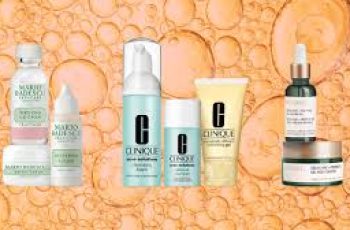
What is a facial toner? How do you choose the best toner for your skin type/skincare routine?
For radiant, healthy-looking skin, it’s not enough to just cleanse your face every day. A much-debated, yet often overlooked step in your skincare routine is using a toner.
These seemingly simple liquids look and feel like water, but for some people, they play an important role in skin health.
Read on to learn about the potential benefits of toners, the different types, and common mistakes to avoid.
The Role of Toner in Skin Care
Using a toner between cleansing and moisturizing can prepare your skin for the next steps in your skincare routine.
While cleansing removes a lot of oil or makeup, using a toner ensures that no residue is left behind.
Once your pores are adequately cleansed, your face can enjoy the benefits of subsequent products like serums, lotions, night creams, and other targeted treatments.
Toners also restore pH levels, which can be disturbed by harsh cleansing products.
Benefits of Toner
According to experts at the Cleveland Clinic, using a toner after cleansing can increase the amount of moisture in the outer layer of the skin, which can improve the absorption of other products.
Some proven benefits of toner include:
Clearer skin: Toner helps remove oil and makeup residue after cleansing.
Extra hydration: Newer generations of toners contain soothing ingredients like hyaluronic acid and niacinamide to lock in moisture in the skin.
Refine pores: By thoroughly cleansing pores, toners can visibly reduce impurities that cause them to enlarge.
Improve pH: Some toners contain acids like alpha hydroxy, beta hydroxy, lactic acid, and salicylic acid to help restore pH levels.
Different types of toners
Toners come in different formulas to suit different skin types and concerns. Older toners almost always contained alcohol, as they were primarily designed to remove impurities.
Today, alcohol-based toners are less common, although some people with oily or acne-prone skin incorporate them into their daily routine.
Alcohols often dry out the skin and strip it of its natural oils, so these toners are not recommended.
Alcohol-free toners are generally gentler and more hydrating, making them particularly suitable for dry or sensitive skin.
There are also toners that contain active ingredients like glycolic acid or antioxidants to target specific skin care concerns.
There are also hybrid toner-moisturizers. These products support the skin barrier and protect the skin from environmental influences and water loss.
Hyaluronic Acid Lotion
Hyaluronic Acid Lotion
• Locks in moisture and moisturizes the skin
• Protects, repairs, and heals the skin
• Anti-inflammatory ingredients
Regular Price $45
Add to Cart
How to Choose the Right Toner for Your Skin Type
Choosing the right facial toner for your skin type is crucial for achieving the best results. Here are some tips to help you make your choice:
Acne-Prone Skin: If you have oily or acne-prone skin, choose a toner with ingredients like salicylic acid to combat excess oil.
Keep in mind that ingredients like salicylic acid can cause dryness to the skin. So if you have dry skin, choose a gentler solution.
Facial toners with niacinamide can also help reduce acne by reducing inflammation.
Dry Skin: If you have dry skin, choose a toner with hydrating ingredients, such as hyaluronic acid, a powerful humectant that draws moisture into the skin.
Sensitive Skin: If you have sensitive skin, avoid toners with alcohol and opt for products with soothing ingredients, such as chamomile or aloe vera.
Pigmentation: Some facial toners claim to have brightening effects, such as those with antioxidants like vitamin C or retinol.
Incorporate Toner into Your Skincare Routine
Toner is a skincare product that sits between cleansing and moisturizing. After cleansing your face, apply toner with a cotton pad or gently pat it into your skin.
Follow with serum and moisturizer. Using toner twice a day, morning and night, will leave your skin refreshed, balanced, and ready for the full benefits of your other skincare products.
Also, if you’re already using skincare products with the targeted ingredients mentioned above (hyaluronic acid, niacinamide, vitamin C, or retinoids), toner isn’t necessary.
In fact, if these ingredients were used alone, they would likely have a higher concentration, as toners may be too diluted to produce noticeable results.
Foundation Skincare offers a range of dermatological products for a variety of issues, whether you’re battling acne, hyperpigmentation, dry skin, or signs of aging.
The highly concentrated products (20% Vitamin C, 10% Niacinamide, 14% Azelaic Acid) rival prescription products, but are still gentle enough for all skin types and available over the counter.
Products include:
Azelaic Acid 14% Cream: Effective for reducing acne, hyperpigmentation, and enlarged pores
Niacinamide Lotion 10%: Ideal for soothing inflamed skin, preventing breakouts, reducing hyperpigmentation, and slowing signs of aging
Hyaluronic Acid Lotion: Ideal for replenishing hydration
Vitamin C Lotion 20%: Ideal for brightening skin and reducing signs of aging
Night Cream with Granactive Retinoid 2%: Great for reducing fine lines, wrinkles, and loss of elasticity
Explore the entire range here.
Common Mistakes You Should Avoid
If you decide to use a toner, avoid the following mistakes to get the most out of the product:
Don’t use toner too often as this can cause dry skin.
Avoid using facial toners that contain alcohol if you have dry skin.
Pay attention to the ingredients in your facial toner and make sure they are suitable for your skin’s needs.
Avoid using toner on the delicate skin around your eyes, as it requires special care.
If you love using toner and look forward to making it part of your skincare routine, make sure you use a quality product that’s tailored to your skin type and individual needs.
If you’re looking for alternative ways to bridge the gap between key skincare steps like cleansing, moisturizing, and sun protection, FS Journal has more science-backed, dermatologically-informed tips.


